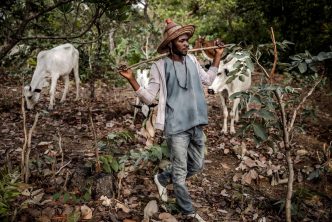Reforming the Police in a Pandemic
By Kenneth Maduagwu and Ndidi Anyanwu
Introduction
In the first half of 2020, the coronavirus pandemic pushed dozens of countries into a severe economic and political impasse. Containing the spread of the novel virus has been difficult even as health organisations across the globe race to find a vaccine. While awaiting the availability of a cure, non-pharmaceutical regulations appear to be the only way to flatten the disease’s curve. The broadly endorsed practice of social and physical distancing has not only helped to slow the spread but has inadvertently slowed down economic activities. The pandemic’s stress on the global economy has impacted millions of people, particularly those whose income sources are affected by the restrictions. Faced by economic hardships or ruin, millions of people defy the restriction guidelines to pursue their survival. The situation may have blurred the lines in adhering to the rule of law, judicial procedures, and enforcing the COVID-19 guidelines. Law enforcement agents, particularly the Police Force, who are at the forefront of implementing the guidelines, have an unenviably challenging task.
Already fatigued from the assortment of security challenges in the country, Nigeria’s security operatives must play new roles and enforce a new set of rules. Enforcing the COVID-19 guidelines in Africa’s most populous nation (and the “poverty capital of the world”) is challenging. Earlier, Nigeria imposed various restraining measures to control the virus’s spread, including restrictions on movements and gatherings that are mainly enforced by Police Force members. In the first two weeks of the lockdown, security agents killed 18 people, a figure higher than the number of COVID-19 fatalities in the country (at that time). There were also nationwide reports on extortion and physical abuse of Nigerians by police personnel enforcing the COVID-19 guidelines.
If anyone doubted that Nigeria has a policing problem, the pandemic made it evident. The rips and tears demand a comprehensive reform of Nigeria’s Police Force. During the lockdown, the chaotic displays were not mainly due to lax COVID-19 guidelines but more about the Force’s classical systemic and operational inadequacies. Police reform in Nigeria should address police corruption, remunerations, training, and operations (mostly deadly force). The desired reform should resolve the anomalies in the Nigeria Police Force. For example, there are strong arguments that improved training and salaries will reduce unprofessionalism and corruption among police officers. According to Transparency International (TI), preventive action through thorough recruitment and education processes can be utilised to address police officers from the outset, rather than halfway through their career. In making the police more professional, the Mexican government has undertaken reforms through changes in compensations for police personnel.
The reform will also focus on police officers’ behavioural patterns and the operational systems that impact policing outcomes. It is undeniably uncertain who takes the blame for inefficient policing, the character of the personnel, or the culture of the institution. An article by the Harvard Business Review acknowledges that police institutions often blame rogue personnel and not the organisational culture. When police organisations fail to address unprofessionalism amongst a few police staff, it can reoccur or fester among a much larger group of personnel. The culture of brutality, corruption, and other negative indices that have been ascribed to the police force may tend to be normalised as the system itself is weak.
Unending Conversations
Persistent problems with police conduct during the pandemic has made manifest that police reforms have produced sub-standard results. Conversations on police reforms in Nigeria are long and halting. For a start, the newly signed Nigeria Police Reform Act should be implemented.
The Act repeals the Police Act Cap. P19. Law of the Federation, 2004 and intends to improve the police’s responsiveness to the expectations of Nigerians. It also provides for a more effective and well organised Police Force, driven by the principles of transparency and accountability in its operations and management of its resources. The Act’s core elements include its poise to establish an appropriate funding framework for the police in line with other key federal institutions in the country. The Act may be considered by many as Nigeria’s newest shot at a transformed police force devoid of extant issues and efficient in addressing the dynamics of insecurity in the country.
The bill, as with similar reform efforts, contains many positive expectations. However, the challenge of reforms has been with the implementation and the challenges of institutionalising change. The passage of the Police bill into law is a critical step towards achieving efficient policing in Nigeria. Therefore, Nigeria’s ruling class must achieve the political will to reform the Nigerian Police. Nigeria’s development partners should provide more support to civil society organisations to push for the passage of the Nigeria Police Bill. This effort is required to force both the state and society into what Daron Acemoglu and James A. Robinson refer to as “the Narrow Corridor” where liberty is achieved as a precondition for social and economic progress.
Elephant Moves
Making police reforms work is the collective responsibility of the ruling class, police, and the public. A study by Ikerd and Walker in 2010 proposes the Herman Goldstein idea, which is a problem-oriented policing. The programme ensures more effective policing practices that hinge on community partnerships, organisational transformation, and problem-solving. Based on the findings from a study of problem-oriented policing using a police department in North Carolina, U.S., it amplifies the relevance of organisational culture in effecting institutional reforms. The highlight of this method is testing personnel’s perception towards the reform through assessments on attitudes, knowledge, and behavioural patterns. This method will help to substantiate the sustainability of the reform and commitment of personnel to follow through the processes.
Undeniably, implementing reforms in the Nigerian Police is capital intensive considering the deficits, particularly in staffing, officers’ welfare, and equipment. For example, the United Nations recommends a ratio of one policeman for 450 residents. Nigeria’s Police Force has about 377,000 personnel, requiring an additional 155,000 officers to meet the UN recommendation. In 2017, the then Inspector General of the Police, Ibrahim Idris, said it would take about five years for Nigeria to achieve the UN recommendations.
The Federal government must secure funding from development partners to implement key aspects of the Police Reform Bill. This collaboration should include technical assistance and knowledge transfer for the Police Force. Several development partners in Nigeria are already providing capacity development for members of the Police Force. However, these efforts should be improved and customised to critical objectives in the Nigerian Police Bill. Importantly, the reforms must plug loopholes of corruption that currently plague the system; otherwise, secured funds will not achieve its objectives. The government must cultivate the political will to open negotiations on the security votes to state governments. A percentage of unaccounted funds should be channeled towards the police, considering that the nation runs a federal police structure that oversees policing nationwide.
Can the Elephant Tiptoe?
As with other forms of reforms, fixing Nigeria’s Police Force has significant but surmountable challenges. Police reforms may be perceived as an alternative policy action for thwarting the demands for the Nigerian Police’s constitutional devolution. However, this requires widespread consultation on the reforms’ objectives–to improve policing in Nigeria regardless of operational structure. Organisation-wide reforms in the current system may lay the foundation for new policing structures.
Institutionalising the reform is an arduous task as change is usually met with resistance. The reform may not enjoy the buy-in of members of the Force. First, such reforms will provide accountability and punishment mechanisms for police personnel, which includes those enmeshed deep in corruption and unprofessional practices. Second, the reform process may not carry the personnel along, thus alienating them from the process; to achieve success and sustainability, police officers need to own the reforms. For the reforms to be successful and sustainable, key stakeholders must support its implementation. Strategic workshops help develop the capacity of the policing staff. The reforms are not a witch-hunting exercise but a programme to improve the wellbeing and service of members of the Force. Police personnel should be used as change champions within their various departments and commands. Police reforms should not be a top-level management affair. It should be democratic enough to give platforms for inputs and feedback from members of the Force. The idea is to create a people-driven approach to police reforms which promises favourable and sustainable outcomes.
Conclusion Policing during the coronavirus lockdown has again reiterated that the Nigerian Police Force requires comprehensive reform. Against the backdrop of the recently signed Police Act, the reform must cultivate collaborations between police personnel and members of the public. While there are other alternative funding sources, such as redistributing a percentage of monthly security votes to the state government, the reform must adopt institutional approaches to addressing systemic corruption. On these grounds, poor welfare, weak reward and punishment system, accountability gaps, and unsustainable measures be addressed.







